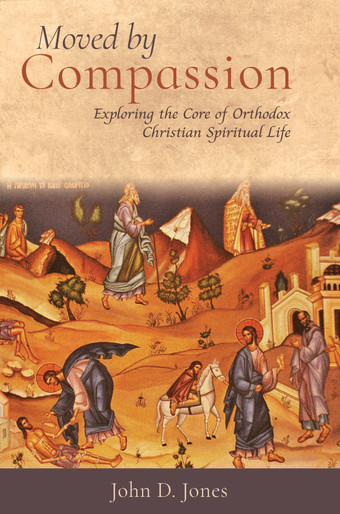
Though compassion lies at the heart of the Gospel, it has been little studied in its own right in the Orthodox Christian tradition. This book, written by an accomplished scholar yet accessible to the lay reader, fills that void by drawing on the broad and ancient tradition of the Orthodox Church.
Learn more or purchase this book at St Vladimirs Seminary Press
Father Jones, who is Priest-in-Charge at Holy Theophany Orthodox Church (Orthodox Church in America), Walworth, Wisconsin, answered some questions about his new book, including his favorite part of the writing process, what he hopes the book can accomplish and where the idea for the book came from.
How would you describe the book in one sentence?
The book provides a response within the Orthodox Christian tradition to the very practical question “Why should we care about being compassionate?”
Is this your first book? What is your publishing history?
This is my fifth book, and it drew on more than a decade of research at Marquette. My other books include a translation and introductory study of The Divine Names and Mystical Theology of (Pseudo) Dionysius the Areopagite (MU Press, 1980) and “Poverty and the Human Condition” (1990). I have also published a number of articles dealing with issues related to compassion, poverty and stigmatization.
Where did the idea for this book come from?
It has always been my conviction that compassion should play a central role in our lives— individually and socially; it is a fundamental attribute of God and Christ, the Incarnate Son of God. Moreover, compassion is fundamentally at odds with, yet can counteract, the ways in which we tend to denigrate, marginalize, judge and reject others. However, there is profound disagreement across a range of disciplines, traditions and cultures about what compassion is, how it differs from pity or mercy; how it is related to justice, etc.
Serving as an Orthodox Christian priest, I am continually captivated by the ways in which compassion resonates within worship services, especially the Divine (Eucharistic) Liturgy, and Holy Scripture, as well as how it is to shape our lives. In the absence of any formal study of compassion in the Orthodox Christian tradition, I decided to focus my life-long interest on compassion by articulating the framework within which compassion is understood, experienced, and lived in the Orthodox Christian tradition.
What do you hope to accomplish with this book?
By drawing on a wide range of writings in the Orthodox Christian tradition, from its beginnings to the present, and supplementing that with a broad multi-disciplinary range of other works, I aimed to show that in this tradition:
- The compassion of God—the Trinity—and Christ fundamentally shapes their presence to creation. Through his Incarnation, Christ radically unites divine and human compassion.
- The capacity for compassion belongs to all humans inherently by nature. We develop and perfect it in the Orthodox Christian tradition through becoming “living icons of Christ”: facing the world and loving others as Christ loves us.
- Human compassion is not simply an emotion but a fundamental virtuous disposition. Grounded in the heart—the holistic center of our lives—compassion is animated by constant neighborliness and hospitality (love of strangers). Compassion involves an alert sensitivity to suffering that in a Christ-like humility bears with and assists others for their sake. In sharp contrast to pity, compassion fundamentally affirms others in their humanity as unique persons; it is radically free from any judgment that denigrates others.
- Compassion plays a vital role in overcoming the many toxic passions and influences that can lead us to be indifferent to suffering or to denigrate others thus poisoning our hearts and minds and undermining our relationships with others, the world around us, and God.
- Compassion is not simply a matter of “charity” or mercy. Rather, it is fundamentally linked with individual and collective efforts to promote personal, social and institutional justice.
How does this book advance or complement your research and/or teaching?
It will provide a primary basis for other work in this area. I draw on it in pastoral work and teaching. Since Orthodox Christians do not have a monopoly on compassion, it can provide a very helpful basis for dialogue with other traditions—both religious and non-religious—about their understanding of compassion.
What was your favorite part of the writing/editing process?
Answer: Engaging in a very interesting dialogue between myself as a philosopher and myself as a priest and an Orthodox Christian.
Philosophy, as a form of questioning and rational analysis, is not just a “head trip” for me. Integrating my philosophical activity with my life as a priest and an Orthodox Christian has been of vital importance to me. As a priest, a central part of my pastoral work, is to celebrate, pray for, encounter, and teach others about the compassion and mercy that is pervasive in the Divine Liturgy and other Orthodox Christian worship services, Holy Scripture, and the lives of many individuals. The dialogue between my philosophical reflection and my pastoral experience of compassion was very helpful and enriching to me. Of course, the life of faith is open to a divine mystery that rational reflection and analysis can embrace but never bring to complete expression.
If you have recently published a book, or if you have one coming out, we would like to feature your publication in an upcoming Marquette Bookshelf feature. More information on the submission process is available online.
Book Details
- Publisher: St Vladimirs Seminary Press (December 6, 2022)
- Language: English
- Paperback: 308 pages
- ISBN-10: 0881417114
- ISBN-13: 978-0881417111



